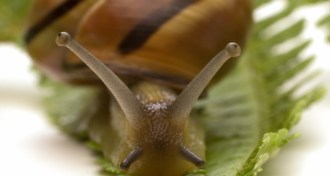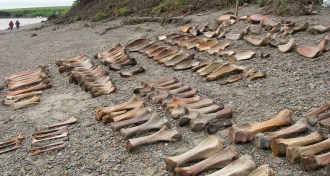Humans
Sign up for our newsletter
We summarize the week's scientific breakthroughs every Thursday.
-
 Health & Medicine
Health & MedicineHuman brain mapped in 3-D with high resolution
“BigBrain” model, the most detailed atlas yet, could improve brain scanning tools and neurosurgeons’ navigation.
By Meghan Rosen -
 Humans
HumansAerial radar sizes up ancient urban sprawl
Angkor, the capital of Cambodia's Khmer empire, included carefully planned suburbs that spread across the landscape.
By Bruce Bower -
 Anthropology
AnthropologySnails trace Stone Age trek from Iberia to Ireland
A genetic quirk linking snails in two distant areas suggests people brought escargot on their migration to the Emerald Isle.
-
 Health & Medicine
Health & MedicineEbola thwarted in mice by drugs for infertility, cancer
Extensive search of existing medicines turns up two that seem to fend off deadly virus.
By Nathan Seppa -
 Health & Medicine
Health & MedicineEven if science can’t make life longer, perhaps a pill can make a long life better
To live long and prosper (physically, not financially), you’d probably rather take a pill than starve yourself. So far, though, most of the evidence says very-low-calorie diets are the best strategy for living a longer life. At least if you’re a worm or a fly. It hasn’t been established that less food means a longer […]
-
 Health & Medicine
Health & MedicineDSM-5 enters the diagnostic fray
Fifth edition of the widely used psychiatric manual focuses attention on how mental disorders should be defined.
By Bruce Bower -
 Health & Medicine
Health & MedicineBalloon Clears Arteries
Excerpt from the June 29, 1963, issue of Science News Letter.
By Science News -
 Archaeology
ArchaeologyAncient Siberians may have rarely hunted mammoths
Occasional kills by Stone Age humans could not have driven creatures to extinction, researchers say.
By Bruce Bower -
 Health & Medicine
Health & MedicineHeaders linked to memory deficit in soccer players
Abnormalities in three brain regions found among those who head the ball most frequently.
By Nathan Seppa -
 Tech
TechComputer scientists grapple with how to manage the digital legacy of the departed
In April, Google added to its services an Inactive Account Manager, which lets you designate an heir who will control your Google data when you die. You choose a length of inactivity, and if your accounts are ever quiet for that long, Google will notify your heirs that they’ve inherited access to your Gmail correspondence, […]
-
 Health & Medicine
Health & MedicineTalk therapy helps Congolese victims of sexual violence recover
Groups sessions using a cognitive processing approach work better than individual support counseling, a study finds.
By Nathan Seppa -
 Health & Medicine
Health & MedicineFlu spreads via airborne droplets
Hand washing goes only so far in retarding flu transmission.